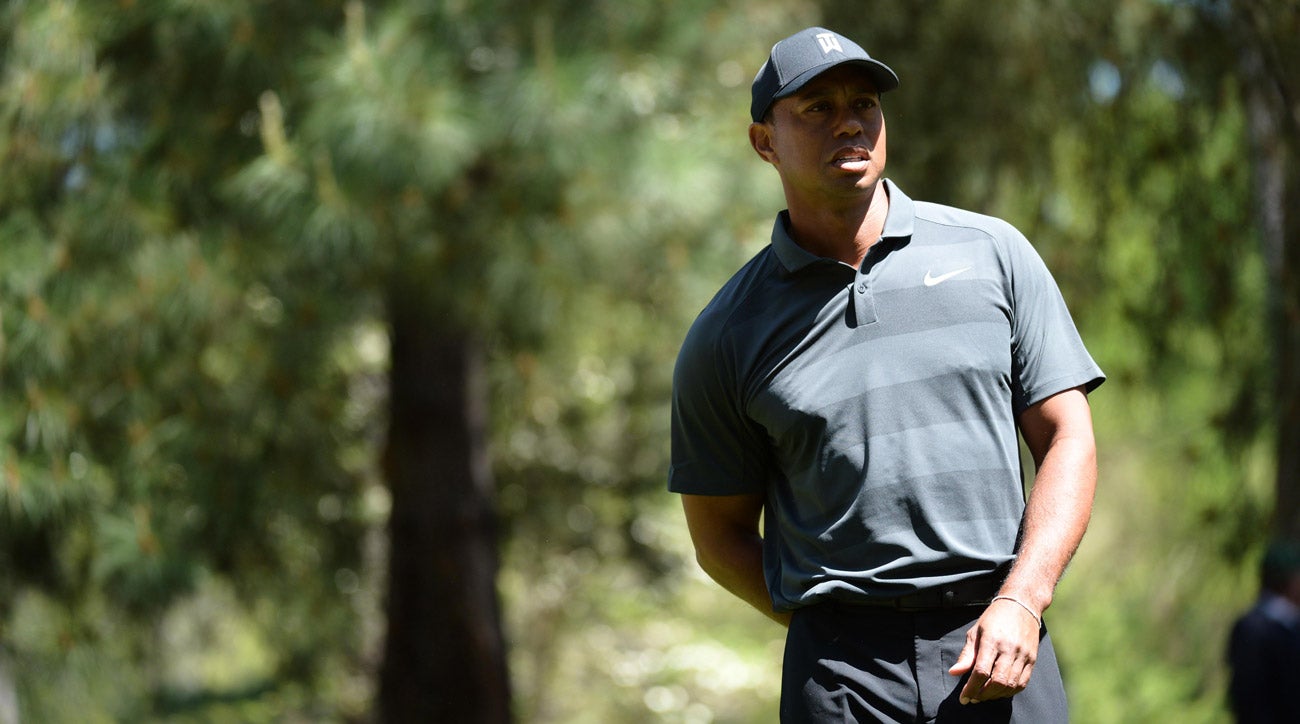AUGUSTA, Ga. — Let’s start with the good news: Tiger Woods did not blow himself out of this Masters with his opening-round 73. He fought hard on the back nine to play the final five holes in two under and salvage his round. He didn’t blow out his back or dislocate his ankle or get crushed by a falling pine tree. His kids still love him.
Now for the bad news: Woods looked jittery off the tee. His distance control with his irons was erratic, leaving a series of frightening downhill putts. He made a mess of every par-5. He got curb-stomped by his playing partner, Marc Leishman. Facing the most benign conditions he is likely to get all week, Tiger is already seven strokes off the lead, looking less like the rejuvenated medical miracle who lit up the Florida swing and more like the post-scandal nearly-man who has repeatedly had his weaknesses exposed at Augusta National.
But there is more good news: this was Woods’s first successfully completed round at a major championship in 32 months. His stunningly good play in March warped expectations well beyond what is reasonable; with any perspective, it should be enough for all of us that Tiger is healthy enough to be back between the ropes at the tournament that has defined his legend. Indeed, the build-up to this round has been exquisite suspense, tinged with disbelief. Is this really happening? Woods, less than a year removed from spinal fusion surgery, was among the pre-tournament betting favorites, even though hasn’t won a major in a decade or a Masters since 2005. His every twitch in the practice rounds was parsed and overanalyzed, his easy demeanor and fine play only heightening the already absurd expectations. But there is golf and there is tournament golf, and they are not at all the same.

As Woods reached the 1st tee on a crisp Thursday morning, for his 10:42 tee time, everything stopped. On the back porch of Augusta National, folks stood up from their tables to crowd the banister. Under the Tree, the chattering class went quiet. On the nearby putting green, fellow competitors craned their head for a glimpse. This was the most anticipated first round tee shot since Woods’s post-scandal return in 2010, when he arrived with his life in embers. But it was not hard to feel dread on the 1st tee on this Thursday, before Woods had even hit a shot.
That’s because, unlike virtually every other golfer in the field, he eschewed driver in favor of a 3-wood. It was a defensive play, as revealing as the iron off the 72nd tee at the Valspar. Tiger still made a fretful swing, yanking his drive into his favorite spot, the left trees. Has any great player ever had as much trouble hitting a fairway as Woods does on Augusta National’s opening hole? Still, he scrambled to save par, and then on the par-5 2nd unleashed a towering draw 351 yards down the fairway. The driver has been the weakest part of Woods’s game during this unexpected renaissance, and his discomfort in shaping the ball right-to-left with it has been a long-standing bugaboo. After the bomb on the 2nd tee, the swollen gallery breathed a collective sigh of relief. But Woods’s wipey approach shot expired in the front bunker and the long third shot that followed was much too strong. The par was a letdown.
Woods rallied with a deft birdie on the short par-4 3rd hole, nearly driving the green, and Augusta National shook. But the bad news was coming, in the form of back-to-back bogeys: out of the bunker on 4, a long 3-putt at 5. He played a gorgeous tee shot on 6, only to burn the edge with a slippery downhill 6-footer. On the par-5 8th hole, Tiger smashed a perfect drive but skanked a low, hooking second shot into an awkward spot left of the green. Another disappointing par ensued.
Amen Corner is where Woods’s round nearly unraveled. On the long, exacting 11th he pushed his drive into the trees, then scattered the gallery with his second shot. He walked off with a homely bogey. At 12, he dumped his tee shot in Rae’s Creek. Tiger Woods does not hit golf balls into the water. He is perhaps the greatest tactician in the history of the game; sure, he hits plenty of bad shots, but a cornerstone of his game has always been to miss in the right places. Short and right on the 12th hole is anything but. The good news? Woods salvaged a crucial bogey by holing a 15-footer from the front fringe after a nervy pitch.
The 13th hole presented another moment of truth. Desperately needing to generate momentum, Woods stepped to the tee of this short, tantalizing par-5 and again capitulated, reaching for his 3-wood. But Woods swung it like a man terrified of going left, and his ball floated into the trees down the right side. Par was the best he could do from there.
Woods’s swing, reconstituted to allow for his balky back, may come and go but his fortitude is a constant. He summoned two flawless shots on the 14th hole for his first birdie in two hours. The 15th hole offered a chance for further salvation; after all, he had eagled it two days earlier in a practice round (and the 13th as well.) But Woods whipsawed a drive miles right into the trees, squandering another precious par-5. He soldiered on, two-putting from 22 feet for par. A nice birdie followed at the par-3 16th, before he parred the last two holes, walking off the course in 25th place.
Afterward, Woods was asked if he was relieved to have survived this good news/bad news round. “Yes,” he said. “I played in a major championship again. But also the fact I got myself back in this tournament and I could have easily let it slip away. I fought hard to get back in there. It will be fun the next 54 holes.”
Woods’s presence here is worth celebrating, even if on Thursday the bad stuff between the ropes outweighed the good. But Tiger has a long way to go if this Masters is going to get really fun.






